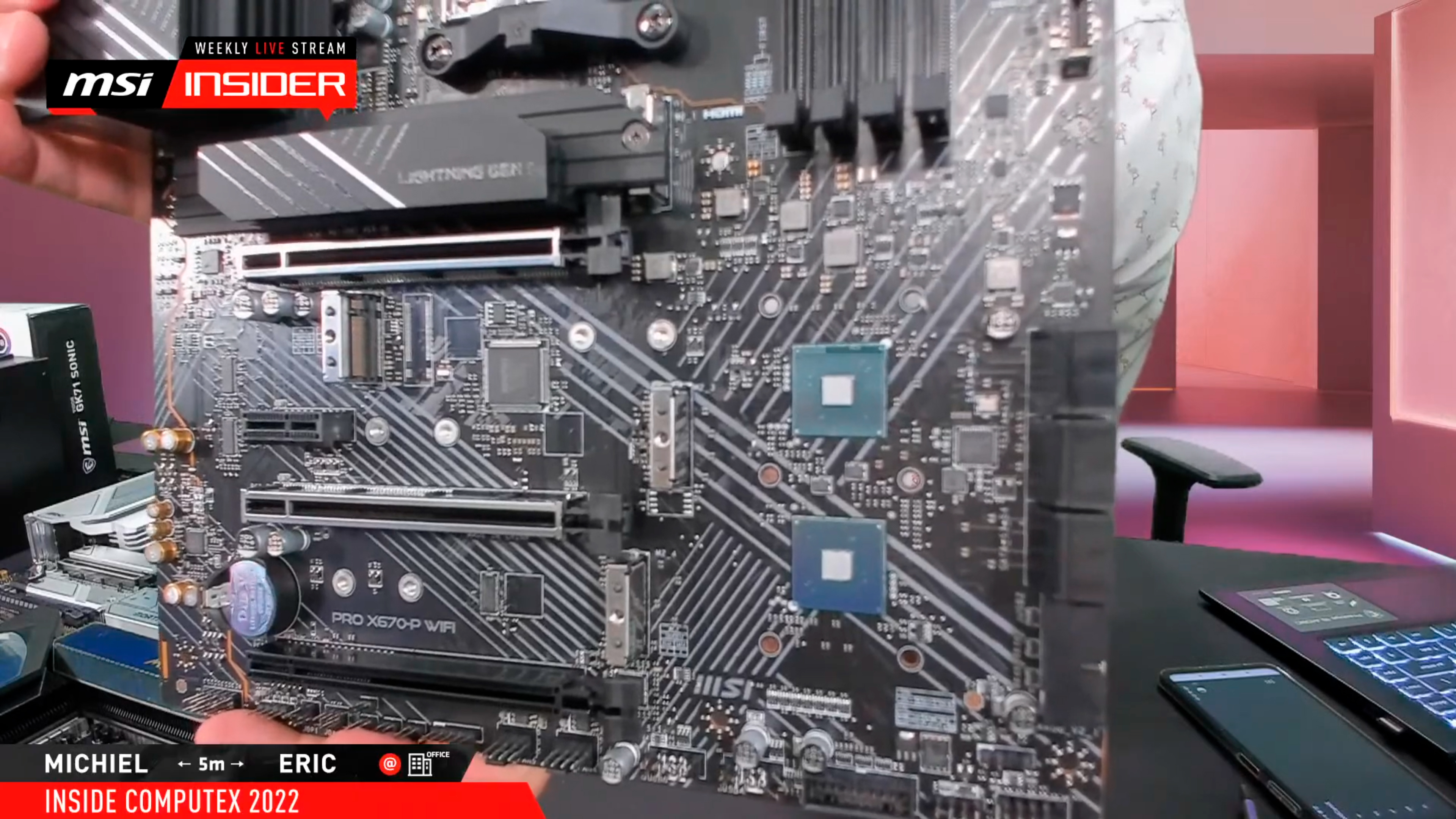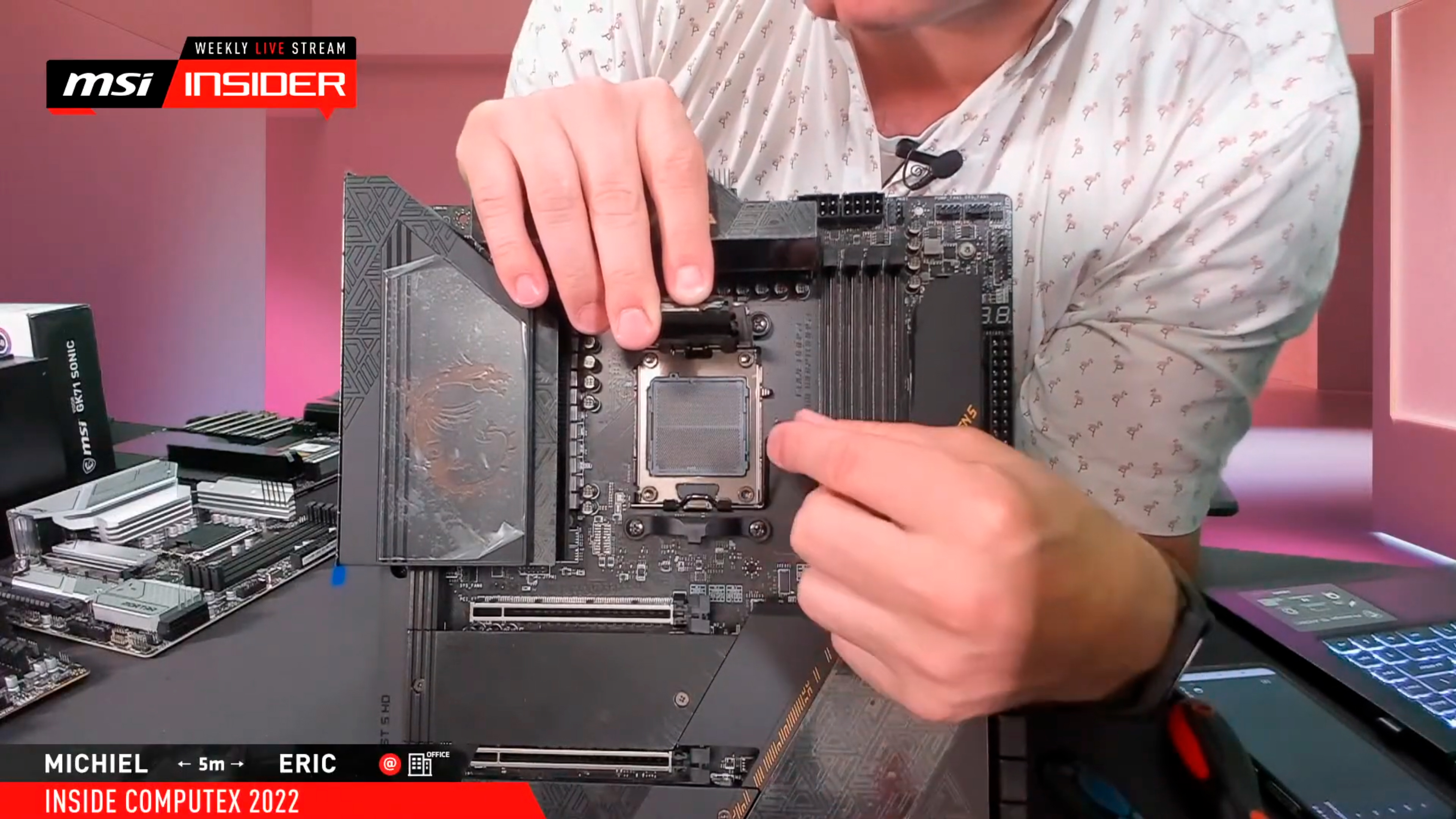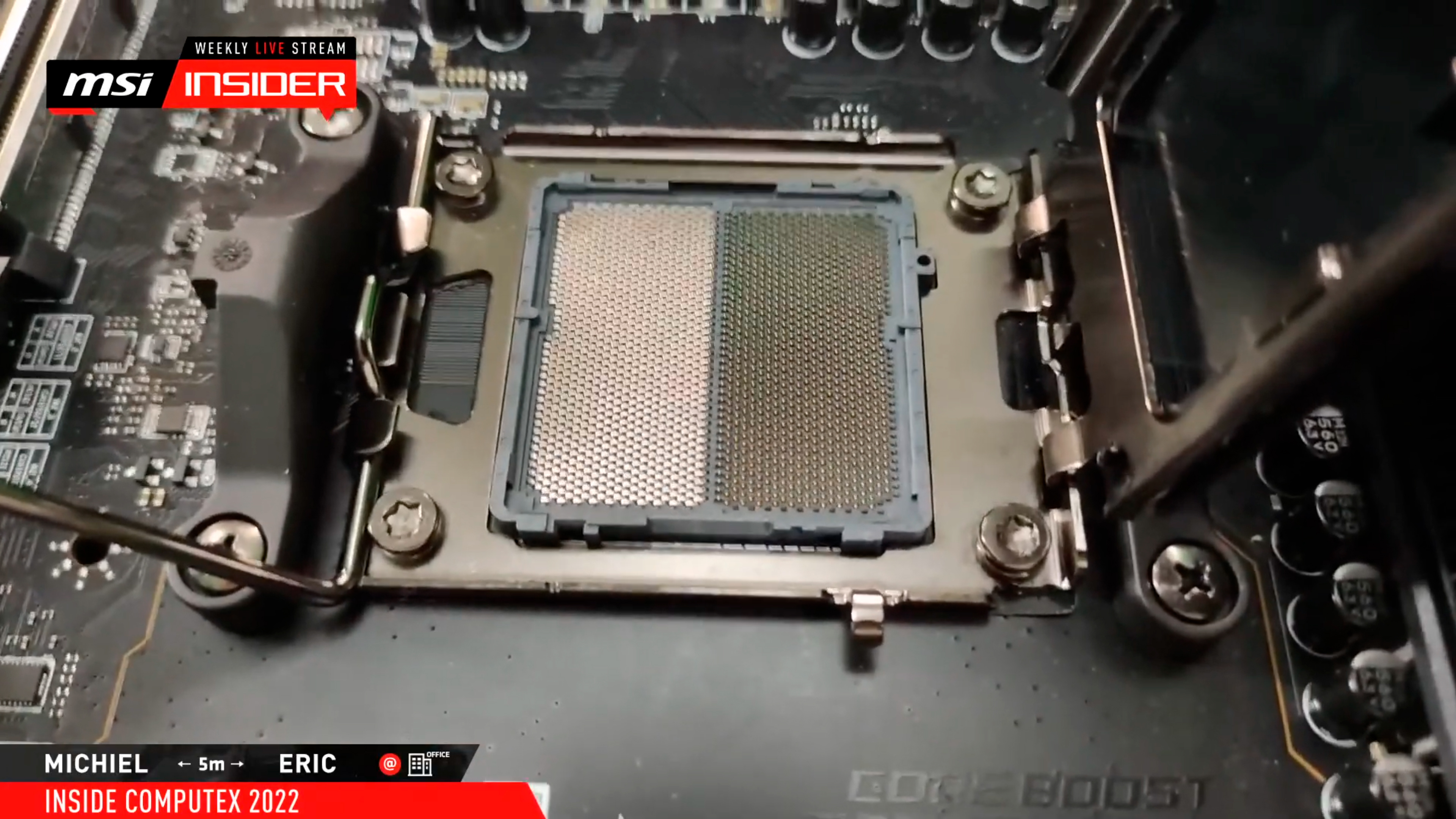MSI Showcases AM5 Socket, X670 Platform's Dual Chipsets
MSI has showcased a couple of the brand's new X670 motherboards in the latest installment of the MSI Insider show. In its video, the company takes us on a small tour around the AM5 socket and the dual-chipset design for AMD 600-series motherboards.
The AM5 socket, consisting of 1,718 pins, will accommodate AMD's impending Ryzen 7000 (Raphael) processors. The novelties of the new socket include an LGA (Land Grid Array) design, socket power up to 170W, DDR5, and PCIe 5.0 support. The AM5 socket brings all that while retaining support for AM4 CPU coolers. It isn't the first time MSI has given us a close look at the AM5 socket. In a previous installation video, the company demonstrated how installing an AM5 processor is similar to installing an Intel chip.
Despite shifting from a PGA (Pin Grid Array) to an LGA design, the AM5 socket preserves the same package size and z-height as the AM4 socket. Therefore, AM5 is compatible with previous AM4 CPU coolers without needing an additional mount. However, MSI's photographs showed that the AM5 socket houses only pins, and there isn't a designated center area for capacitors, unlike Intel's LGA115x sockets. The reason is that the surface-mounted capacitors are no longer under the AMD processor. With Zen 4, AMD moved the capacitors to the top of the chip, which is why the funky design has multiple cutouts. Only time will tell whether it's a sound decision to relocate the capacitors, as many users are worried that the excess thermal compound could fall on the capacitors.



One of the blessings with the 600-series chipsets is that they won't require active cooling, unlike X570 motherboards, which came with annoying tiny cooling fans. The usage of passive heatsinks implies that the X670 chipset is very energy efficient. For comparison, X570 had a TDP of around 15W. AMD later introduced the X570S chipset that only required passive cooling, so it's refreshing to know that X670 will be silent right out of the gate.
The enthusiast X670 platform will feature two chipsets to provide double the connectivity. As expected, ASMedia designed the X670 chipset, a product of TSMC's 6nm manufacturing process. It's a nice upgrade since X570 was on GlobalFoundries' 14nm process node.
The photograph of MSI's MEG X670E Ace motherboard confirms that both chipsets are identical in size. Although AMD has announced Zen 4, the chipmaker is still withholding the juicier details of the Ryzen 7000 processors and 600-series chipsets. For example, it's still up in the air whether the connection from the Zen 4 processor to the 600-series chipset will be PCIe 4.0 or PCIe 5.0. Thus far, PCI-SIG has only validated the 600-series chipset for PCIe 4.0 x4.
AMD will launch Ryzen 7000 this Fall, so we're only months away from learning more about the chipmaker's state-of-the-art Zen 4 chips.
Get Tom's Hardware's best news and in-depth reviews, straight to your inbox.

Zhiye Liu is a news editor, memory reviewer, and SSD tester at Tom’s Hardware. Although he loves everything that’s hardware, he has a soft spot for CPUs, GPUs, and RAM.
-
Alvar "Miles" Udell ReplyOnly time will tell whether it's a sound decision to relocate the capacitors, as many users are worried that the excess thermal compound could fall on the capacitors.
Not a problem if you don't use TIM that's not electrically conductive, or use the proper amount. -
wifiburger f AMD and their garbage 1st gen new platform chipsets / moboReply
if I were to guess it will have issues with DDR5 memory for months, they will stop productions after release day & they will stop bios support after just 2 cpu gens
no amount of premium flare & worthless pcie5 will get me to buy into 1st gen AM5 mobo with Zen4 being 16core only and crap performance increase -
helper800 Reply
You are basing all of your claims on nothing that is unbiased. When Ryzen launched it was a mess in several of the ways you mentioned, however, that has no barring on Zen 4. I will be right there with you if it releases with issues. "only" 16 cores, lmao. If you need more than 16 there are several options more relevant to you up to 64 if you had any need for more threads.wifiburger said:f AMD and their garbage 1st gen new platform chipsets / mobo
if I were to guess it will have issues with DDR5 memory for months, they will stop productions after release day & they will stop bios support after just 2 cpu gens
no amount of premium flare & worthless pcie5 will get me to buy into 1st gen AM5 mobo with Zen4 being 16core only and crap performance increase -
InvalidError Moving the CPU's bypass capacitors to the package is very much necessary for high-speed designs since their effectiveness is closely related to how close you can put them to the load. Putting them on-package mostly eliminates the socket from the equation.Reply
I'm actually surprised AMD managed to get away with few or no bypass caps on package with AM4. -
KananX Reply
Unlikely and even Zen 1s problems were wildly overstated by toxic people and haters. Actual people with knowledge (not tech noobs) didn’t have big problems with it, some annoyance maybe. And the problems were all solved with bios updates later, so it was only the very beginning of Ryzen 1000 and that’s it.wifiburger said:f AMD and their garbage 1st gen new platform chipsets / mobo
if I were to guess it will have issues with DDR5 memory for months, they will stop productions after release day & they will stop bios support after just 2 cpu gens
no amount of premium flare & worthless pcie5 will get me to buy into 1st gen AM5 mobo with Zen4 being 16core only and crap performance increase -
InvalidError Reply
My first experience dealing with AM4 is having a no-boot, then getting accused by the store of frying components, the store spending an hour parts-swapping components until they found a combination that worked on the board before they could do a BIOS update and ultimately find out that all components were perfectly fine.KananX said:Unlikely and even Zen 1s problems were wildly overstated by toxic people and haters.
The only way it could have gone worse would have been if the store hadn't struggled to get anything working, then it would likely have stuck with the initial accusation. -
helper800 Reply
My first Zen Experience was with my 3900x on release day with the ASUS x570-f board. There were several overclocking settings bugs, multiple bugs related to Ryzen Master program causing issues, chipset drivers not installing / updating properly, et cetera. People that downplay the problems related to the 1000s CPU release are living in a bubble. I remember so many posts here about so many problems. In my case everything was fixed within the first few weeks of release and none of the issues prevented safe use of the CPU for what I needed it for.InvalidError said:My first experience dealing with AM4 is having a no-boot, then getting accused by the store of frying components, the store spending an hour parts-swapping components until they found a combination that worked on the board before they could do a BIOS update and ultimately find out that all components were perfectly fine.
The only way it could have gone worse would have been if the store hadn't struggled to get anything working, then it would likely have stuck with the initial accusation.
For Zen 4 I expect a better release than the 1000, 2000, 3000, and 5000 series CPUs. AMD has become a bit better on release for ever major new CPU series launch since the 1000s. -
KananX Sorry but anecdotal stories are hardly evidence, and most people as a matter of fact, had low to no problems with it. Otherwise Ryzen 1000 would’ve been a huge failure, but it wasn’t.Reply
Here my own anecdotal story: 3700X didn’t boot with both 3600 RAMs in (2x16 GB) on my X570 board, did a quick bios update and it worked then flawlessly. That’s it. I bet most people had the same story as me or even easier, depending on which Ram they used, the more you want the more you’re running into compatibility problems. With Ryzen 1000 it was simple to get it running with lower clocked Ram, guess what, that’s what most people did. It was more complicated once you wanted more clocks and possibly more than advertised by AMD. -
helper800 Reply
You have no idea what you are talking about. Reddit, Toms, and other forums were blowing up when Ryzen 1000 released with all kinds of issues for months. It is widely known that Ryzen 1k had a bumpy launch with many many BIOS, RAM, and connectivity issues that were widespread.KananX said:Sorry but anecdotal stories are hardly evidence, and most people as a matter of fact, had low to no problems with it. Otherwise Ryzen 1000 would’ve been a huge failure, but it wasn’t.
Here my own anecdotal story: 3700X didn’t boot with both 3600 RAMs in (2x16 GB) on my X570 board, did a quick bios update and it worked then flawlessly. That’s it. I bet most people had the same story as me or even easier, depending on which Ram they used, the more you want the more you’re running into compatibility problems. With Ryzen 1000 it was simple to get it running with lower clocked Ram, guess what, that’s what most people did. It was more complicated once you wanted more clocks and possibly more than advertised by AMD. -
KananX Reply
Just confirms what I already said.helper800 said:You have no idea what you are talking about. Reddit, Toms, and other forums were blowing up when Ryzen 1000 released with all kinds of issues for months. It is widely known that Ryzen 1k had a bumpy launch with many many BIOS, RAM, and connectivity issues that were widespread.
Give me some hard evidence, factual proof of how many users had problems vs users that had not. Yea, no, you’re not winning this argument. Ryzen 1000s problems were greatly overstated. Your toxicity on the other hand doesn’t help you either. Know more about this <Mod Edit> than you will ever know.